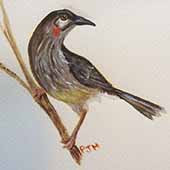
THE sound of Cowes tears the air and jangles my nerves – the chainsaw ! All too often we hear it in what should be a quiet residential area. Who is removing more trees and why? Is it truly because there is a safety problem? Is it because of fire concerns, even if it is a residential area? Or is it really because they (the cutters) want a view, think the vegetation is untidy or think the tree is too big and might fall on them despite it being strong and healthy?
I prefer to abide by Winnie-the-Pooh's definition of supposition: "Supposing a tree fell down when you were underneath it? Supposing it didn't?"
Whatever the reason, trees and vegetation continue to disappear around the town and where do the birds go? When it gets too much, I return to the comfort of my garden and the birds that call it home, or at least a stop along the way.
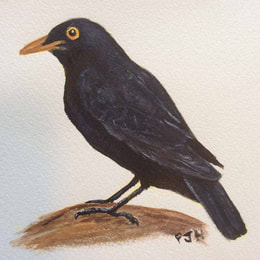
Two non native birds frequent our garden – the Blackbird and the Spotted Turtle-Dove. The blackbird is ever present, patrolling the garden and making its nest along the fence on the shrubs. It has some quite annoying habits - digging up recently planted vegetables and other seedlings in its energetic search for food, and spreading mulch and soil around with great delight.
It also hogs the shallow bird baths, emptying them while seemingly not being interested in the bigger water containers. We have several pairs of blackbirds in the garden and they have frequent territorial tiffs, especially in the mating season. Despite these annoyances their beautiful singing is a pleasure to listen to. They sing joyfully at all hours of the day and seem to especially enjoy singing in the rain, perhaps thinking of their European heritage.
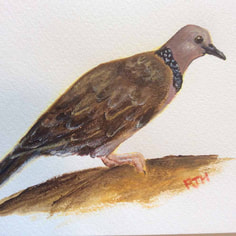
The turtle-doves enjoy a bath in the glass casserole bowl under the front garden tap. They do not splash. They just sit in the water and spread their feathers and soak up the moisture. They also drink very daintily. I also find the doves' sunbathing antics interesting to watch. They lie on their tummy and spread one wing at a time as they enjoy the warmth. Obviously being so oblivious to their surroundings can make them vulnerable to predators, but it looks very relaxing. Turtle-doves certainly embody peace.
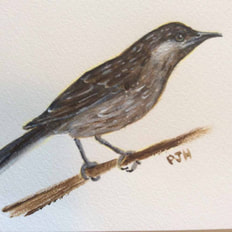
Little Wattlebirds also enjoy diving through water bowls and displacing all the water in the shallow dishes. They and their croaky voices are ever present in the garden in their striped grey plumage.
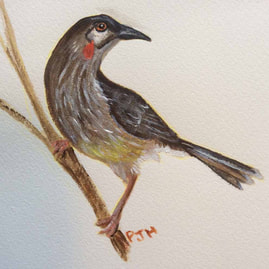
They enjoy diving in and out of the glass casserole bowl near the front garden tap and often empty the container with their enthusiasm.
The strangest thing I have observed them do is to sunbathe by lying flat on the ground head down and wings spread out while staying completely still for some time. The first time I saw one do this I thought it was dead and was quite relieved when it sat up and flew away.
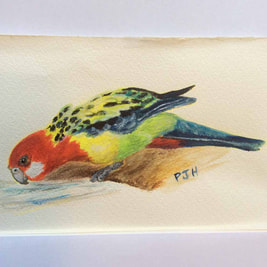
A pair of rosellas regularly visit our garden feeding high in the trees and then enjoying a drink and bath in the glass bowl. They have a very interesting bathing style. One at a time they walk around the rim of the bowl several times and then gingerly lower themselves into the water often holding onto the side of the bowl with one foot, possibly for a sense of security, before finally enjoying a dignified bath.
We have two silver birches in the garden and, although these trees aren't indigenous, the rosellas absolutely adore eating the seeds. They sit for quite some time holding on with one foot while eating the seeds using the other. I have been reasonably informed that many parrots will hold on with their right foot for stability while eating with their left, and that is certainly what rosellas do. Eastern Rosellas are quite wary of humans but are wonderful to watch from afar or through the window. They are very welcome garden visitors.
The solace of birds III: Patsy Hunt continues her series on the birds that visit her Cowes garden.